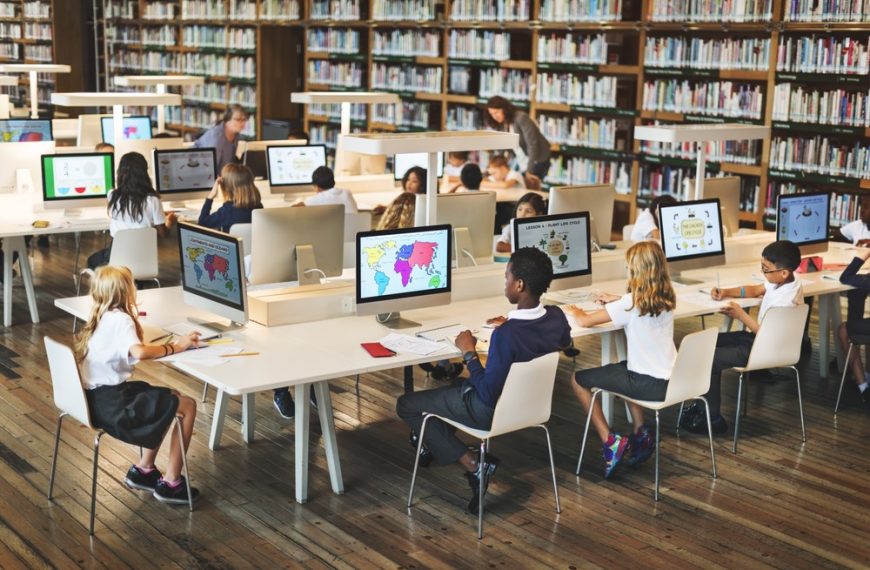Today, computers are utilized for everything in education and have become so pervasive. Everything in between, from basic computer operations such as generating a Word document to sophisticated weather forecasting and drug discovery is done on computers.
Although computers are becoming a part of every area of life, should school children be exposed to them at a young age? Are there any benefits of using computers in educational institutions? Yes, that’s the answer.
Institutions have employed computers in education for several purposes for a while now. They are used by teachers to gather educational resources and activities as well as student data. Students, on the other hand, use them as sources for learning.
The benefits of computer education in the classroom are not new, but the scope and use of computers in the classroom have expanded. Students are enjoying unprecedented access to IT facilities at both. The benefits of computer education in the classroom are not new, but the scope and use of computers in the classroom have expanded. Students are enjoying unprecedented access to IT facilities at both.
What is Computer Education ?
So, what is computer education? The answer is simple; computer education entails acquiring fundamental knowledge and abilities for operating computers to achieve specified tasks. Computer education encompasses more than just fundamental computer knowledge; it also includes many branches of study in a variety of fields and industries.
Computer education is a broad word, but there are two main concepts utilised in education: understanding computer usage and acquiring knowledge about computers. The definition of computer education varies depending on the period under question. Previously, computers employed languages that were too complex for everyone to understand; only certain persons with special qualifications could be taught about and in computers. However, as technology has advanced, their applicability and reach have expanded due to the ease they offer to ordinary people and the sophisticated operations they can accomplish. As human society improves in technology, the usage of computers will become increasingly widespread.
Uses of Computer in School Education
- Personalisation in Education
- Instant access to Information
- Preferred Education Method
- Prepares them for the Future
The use of computers in Education is popular with students. Students enjoy learning at their own pace, and the use of computers in education plays a big part in this. Students are always eager to learn from computers, whether they are used as a projector, robotics, or anything else. Computers and other technological tools will always enhance classroom instruction and bring new teaching strategies
Students can benefit from the internet just as much as adults do. It provides students with immediate access to solutions outside of those found in their textbooks or written there. Children of today will utilise Google to find information since they are already accustomed to using it. Computers, on the other hand, will enable students to study any subject more thoroughly while still directing them to the appropriate resources.
Students will welcome the addition of computers in their education syllabuses since they are already familiar with and utilise tablets, smartphones, and home devices. This makes learning computers simple. They enjoy learning with these tools and are content to utilise computers for homework at any time.
Making kids future-ready is one of the benefits of computer education in school. Computers are needed wherever people go, whether they want to work in business or the workforce. Learning computers at a young age offers kids the confidence to be prepared for any hard roles that life may present them with. In other words, it prepares kids for the workforce, and students who use computers today in school will be skilled at using them there. Ask yourself, did we know what computer education is? when we were in school and how difficult it was for us to develop the skills required for using computers. Do not forget that the Benefits of computer education go beyond merely teaching students how to use computers; it also encourages and prepares them to think critically, do independent research, and be tech-savvy.
Role of Computers in Education
- Advances in Technology
- Increased Effectiveness
- Has an impact on career decisions
- Increased Creativity
We consider it our responsibility as one of the greatest institutions to keep up with the rapid advancement of technology. Computers, iPads, and interactive whiteboards are examples of tools that are constantly getting better and more advanced. In this approach, kids are constantly involved in worthwhile activities that not only help them learn but also improve them in more ways than we can understand. The roles of Computers in education are, in essence, one of the best tools for educating children about the world.
Importance of schools has a history of enhancing student performance by fostering greater engagement in their academic work. Computers are thought to fully improve kids’ mathematics understanding, critical thinking, and academic performance in addition to aiding in problem-solving. Computers are also well known to have a significant impact on pupils’ capacity to perform well in competitive tests. Children between the ages of three and four will benefit significantly from computer exposure in terms of abstraction, intelligence, nonverbal abilities, and long-term memory.
Early computer exposure will encourage students to pursue careers in the engineering and technology areas. Students’ understanding of how computers have affected people’s daily lives is strengthened by their use of computers in the learning environment. When students prepare for higher education, the knowledge they gain during their school years will improve their enthusiasm for technology-related topics.
Students have the opportunity to use their creativity effectively in computer lessons at schools. For instance, if a class is required to research how to draw a dam, a bird, or a vehicle, students can look up several techniques online. Either a solitary or a group activity is possible. Learning computer skills in school additionally substantially decreases the amount of time needed to learn something new. Students might be requested, for instance, to research how to maintain a clean environment. Computer searches will provide pupils with suggestions on how to keep their immediate environment clean even though they already know how to do it. Furthermore, they can learn how to reuse everyday objects that could otherwise go to waste
Computer use in the classroom is now required since they are so ingrained in our everyday lives that failing to learn how to utilise them can be a major liability.
At our school, one of the easiest methods to study outside of books is by using computers in the classroom. For this reason, we frequently hold computer classes to improve both our skills and those of the students.
Computers in the classroom offer a variety of advantages, such as improved engagement, information access, individualised instruction, collaboration, and preparing students for the digital future. By adopting computer education, schools give students the tools they need to succeed academically and in the workplace in a technologically advanced culture.
Please visit Eurokids for more information about children and benefits.
For informative and accurate articles on all things related to your new born-toddler’s development, growth, health and nutrition, follow EuroKids Blogs and do check out our nationally recognized preschools – EuroKids for the first step in your kid’s educational journey!
















